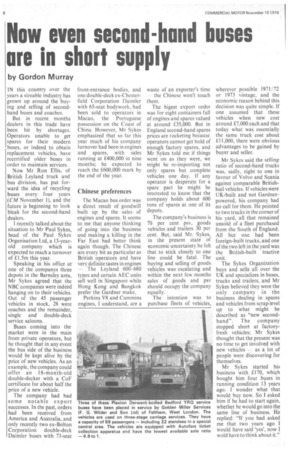Now even second-hand buses are in short supply
Page 30

If you've noticed an error in this article please click here to report it so we can fix it.
by Gordon Murray
IN this country over the years a sizeable industry has grown up around the buying and selling of secondhand buses and coaches.
But in recent months dealers in this trade have been hit by shortages. Operators unable to get spares for their modern buses, or indeed to obtain replacement vehicles, have recertified older buses in order to maintain service& Now Mr Ron Ellis, of British Leyland truck and bus division, has put forward the idea of recycling buses every four years (CM November I), and the future is beginning to look bleak for the second-hand dealers.
I recently talked about the situation to Mr Paul Sykes, head of the Paul Sykes Organisation Ltd, a I3-yearold company which is expected to reach a turnover of £1.5m this year.
Speaking in his office atone of the companys three depots in the Barnsley area, Mr Sykes agreed that the NBC companies were indeed hanging on to their vehicles. Out of the 45 passenger vehicles in stock, 28 were coaches and the remainder, single and double-deck service saloons.
Buses coming into the market were in the main from private operators, but he thought that in any event the bus side of the business would be kept alive by the price of new vehicles. As an example, the company could offer an 18-month-old double-decker with a CoF certificate for about half the price of a new vehicle.
The company had had some notable export successes. In the past, orders had been received from America and Australia, and only recently two ex-Bolton Corporation double-deck Daimler buses with 73-seat front-entrance bodies, and one double-deck ex-Chesterfield Corporation Daimler with 65-seat bodywork, had been sold to operators in Macao, the Portuguese possession on the Coast of China. However, Mr Sykes emphasized that so far this year much of his company turnover had been in engines and spares, with sales running at £400,000 in nine months; he expected to reach the £600,000 mark by the end of the year.
Chinese preferences
The Macao bus order was a direct result of goodwill built up by the sales of engines and spares. It seems to me that anyone thinking of going into the business and making a killing in the Far East had better think again though. The Chinese are every bit as particular as British operators and have very definite tastes in engines — The Leyland 600-680 types and certain AEC units sell well in Singapore while Hong Kong and Bangkok prefer the Gardner make.
Perkins V8 and Cummins engines, I understand, are a waste of an exporter's time the Chinese won't touch them.
The bigest export order was for eight containers full of engines and spares valued at around £35,000. But in England second-hand spares prices are rocketing because operators cannot get hold of enough factory spares, and Mr Sykes told me if things went on as they were, we might be re-importing not only spares but complete vehicles one day. If any operator is desperate for a spare part he might be interested to know that the company holds about 600 tons of spares at one of its depots.
The company's business is 70 per cent psv, goods vehicles and trailers 30 per cent. But, said Mr. Sykes, in the present state of economic uncertainty he felt that to stick closely to one line could be fatal. The buying and selling of goods vehicles was escalating and within the next few months sales of goods and psv should occupy the company equally.
The intention was to purchase fleets of vehicles, wherever possible 1971/72 or 1973 vintage, and the economic reason behind this decision was quite simple. If one assumed that these vehicles when new cost around £7,000 each and that today what was essentially the same truck cost about £11,000, there were obvious advantages to be gained by buyer and seller.
Mr Sykes said the selling. ratio of second-hand trucks was, sadly, eight to one in favour of Volvo and Seania against comparable Britishbuil vehicles. If vehicles were UK-built and not Gardnerpowered, his company had no call for them. He pointed to two trucks in the corner of his yard, all that remained unsold of a fleet purchased from the South of England. All hut one had been foreign-built trucks, and one of the two left in the yard was the British-built tractive unit.
The Sykes Organization buys and sells all over the UK and specializes in buses, trucks and trailers, and Mr Sykes believed they were the only company in the business dealing in spares and vehicles from scrap level up to what might be described as "new secondhand". The company stopped short at factoryfresh vehicles; Mr Sykes thought that the present was no time to get involved with new vehicles as a lot of people were discovering for themselves.
Mr Sykes started his business with £170, which bought him four buses in running condition 13 years ago. I wonder what that would buy now. So I asked him if he had to start again, whether he would go into the same line of business. He replied; "If you had asked me that two years ago I would have said 'yes', now I wold have to think about it."




































































































